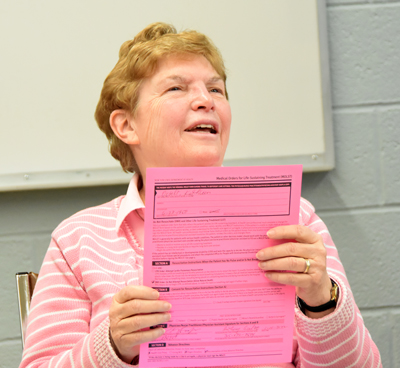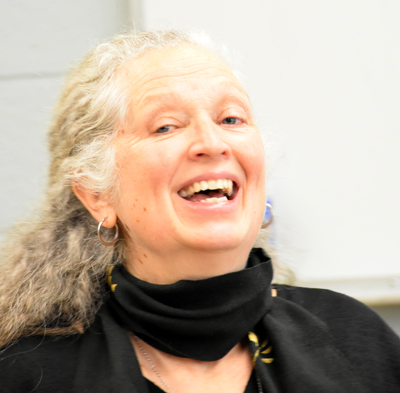
Sister Kathleen Osbelt, a Franciscan Sister, says that those who are diagnosed with an end-stage disease must focus on their body’s needs, particularly when they are in treatment, but they cannot neglect their emotional and spiritual lives. (Sun photos | Tom Maguire)
By Tom Maguire | Associate editor
“This isn’t a comedy talk,” Sister Kathleen Osbelt said of the seminar titled “Take Charge of the Time You Have.” It was not a maudlin presentation, either.
“I have a dear friend who has lived with stage 4 cancer for 12 years now because she had a goal to see her two boys graduate from high school,” Sister Kathleen said Jan. 13 at the Spiritual Renewal Center in Syracuse.
“Then it was: They have to graduate from college—I have to be there for college. Then it was, I have to see them get married. Then it was, I have to see my grandchildren. She’s still alive and doing well, waiting for the grandchildren. So, we need goals.”
Listing goals is one tool to maintain emotional health after receiving a serious diagnosis; tips for physical and spiritual health also went out to the 11 attendees who were there in person and the 20 people who joined online.
“I apologize, but I only got my own stories to share,” said Sister Kathleen. The attendees needed no apology from Sister Kathleen or her partner in the presentation, Kristin Barrett-Anderson.
Something to hang onto
“I like that they offered a tool for people to use who are struggling with end-of-life issues, cancer; it’s a very confusing time for people and so to give them something to hang onto from two people with such deep experience, I think it’s really wonderful,” said Steven Moore, the director of the Spiritual Renewal Center at 1342 Lancaster Ave.
A chaplain and a spiritual director, Sister Kathleen is a Franciscan Sister who has worked with those who are dying at Francis House for 30 years. Almost three years ago, she was diagnosed with an eye cancer, and she went into treatment for metastasis.

Kristin Barrett-Anderson, the director of the Saint Marianne Cope Shrine & Museum in Syracuse, and Sister Kathleen Osbelt, OSF, hope to offer a retreat 10 a.m.-2 p.m. March 11 at Christ the King Retreat House in Syracuse.
“I was having this experience,” she said, “of who am I now that I’m sick? … It’s kind of hard to come and talk about end of life, but we, all of us, are going to know someone who is at end of life. … What are some ways in which I can enrich my life at the end?”
Those given a serious diagnosis may ask, Why me? “Well, my feeling is why not me?” Sister Kathleen said. “I mean, this is life, right? Our bodies were never meant to be indestructible.”
“But do you know,” she said, “our spirit overcomes the body oftentimes. And being in nature is … able to heal us.” She quoted a woman in one of her two support groups: “‘I went out and shoveled and I felt great.’ And she’s got bone cancer.”
Co-presenter Barrett-Anderson is the director of the Saint Marianne Cope Shrine & Museum, a sponsored ministry of the Sisters of St. Francis. The seminar’s promotional sheet says she created Empathy in Action, a collection of programs addressing current issues, with the intention of teaching empathetic practices to use in all phases of life’s journey.
Of her personal journey, she said, “I’ve been traveling to a cancer center with my husband for years now,” and her father is in the last stages of Alzheimer’s.
Respect and dignity
In the journey that a serious diagnosis brings, she said, “we deserve to give ourselves the respect and the dignity of knowing, of understanding, of resting, of every single thing that we might need and being aware of our feelings and what would make us feel better and opening up that awareness and the intention to do for ourselves.”
The flyer for “Take Charge of the Time You Have” lists an Integrative Care Plan with three pillars. “We plan birthdays, big birthdays,” Sister Kathleen said, “we plan for special family events; why wouldn’t we plan for how we want to move into the next realm of life.” Here are examples:
Emotional:
• Consider a support group, social worker or mentor, or a therapist.
• Seek a consultant for finance and employment options.
• Establish a clear chain of communication for important information (passwords, prescriptions, veterinary contacts, insurance or bank accounts).
• Consider those who need to hear these statements: Thank you. Will you forgive me? I forgive you. I love you.
• Select or make mementos to leave or give those I love, i.e., quilt, stuffed animal, charm, photo, book.
Physical:
• Have I received answers to all of my questions regarding my diagnosis?
• Can I optimize my exercise?
• Consider a dietician.
• Eat fresh seasonal foods.
• Manage my pain to keep below level 4 on a 1-10 scale.
• Find comfort in closing my eyes whenever I want to.
• Consider time away from home and its responsibilities.
Spiritual:
• Make peace with my Creator.
• Do a life review for a sense of accomplishment.
• Keep a daily journal of blessings, dreams and feelings of gratitude.
• fivewishes.org [a sample: I wish for all my family members to make peace with one another]; https://www.health.ny.gov/forms/doh-5003.pdf; Health Care Proxy.
• Funeral [maybe even write my own obituary]/prayer service/memorial
• Make time to be in nature—walking, sitting, viewing.
• Ask for support by means of prayer, spirit, energy or holding space.
• Choose cultural/religious practices/rituals that inspire me.
• Meditate or find quiet moments to rest and reflect.
Barrett-Anderson said, “Find a friend who wants to walk with you. … The intention is that we’re going to talk about things—it’s not going to be the weather, it’s going to be, this is what’s going on with my life. If you can find that person, that’s awesome. …, being open to community.”
She advises good nutrition but “also, indulge. Don’t deprive yourself. I don’t know about you, but if someone tells me I can’t have something, I want it, even if I didn’t before. It is something that I’ll think about all the time. Don’t put yourself through that. If you want something, make a plan for it. After dinner, a little piece of chocolate …, little glass of wine. … If you plan it, you won’t eat the whole cake.”
One attendee said her husband died less than a year ago after five years with lung cancer. “This is invaluable information,” she told the presenters, “and I couldn’t be happier to learn about it and then do some reflection on some of the things that I could have done differently that probably would have been a big help. … I’m just so glad that I came, and wonderful presentation.”
A man in attendance said humor would be a big part of taking charge of the time he has left.
One woman said her husband has the dementia of Parkinson’s, and “now it’s so helpful to know that we had those discussions.”
‘Staying in contact’
Asked how she is doing, Sister Kathleen said: “As you can see, I’m doing very well. … So I praise God for every day, and while I go through treatment, what I can do I will continue to do.”
She had to withdraw from Francis House, but she goes over every day now to see residents and to give Communion, to be a part of that community. “I need that family, but I’m not in the offices, I’m not involved in the administration,” she said.
Asked if she has any favorite help from the seminar’s topics, she said: “I think for me my spiritual life is the strongest piece …, staying in contact every morning, having quiet time …, solid foundation of my day, which as Sisters we’ve been doing that whether we’re physically well or not, but I think it’s what sustains all of us, and any one of us, not just religious …, dialed into our Creator every day and to appreciate the many blessings that we have—that’s what sustains me.”







